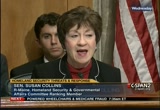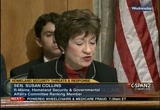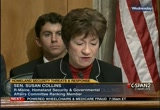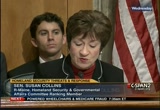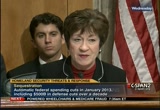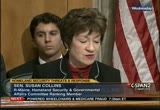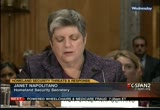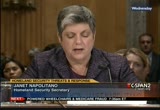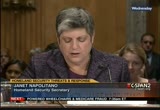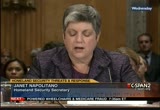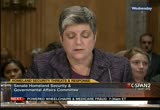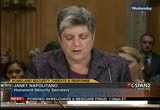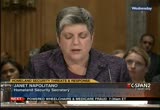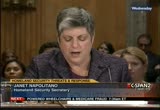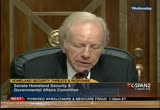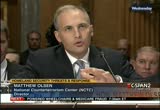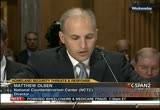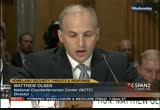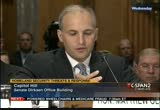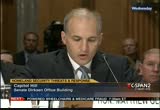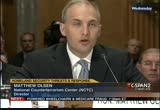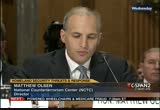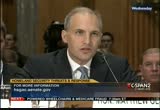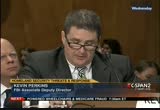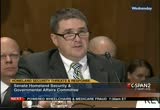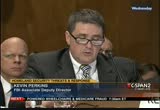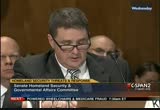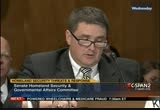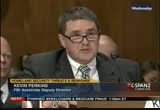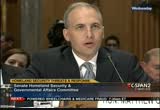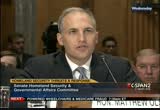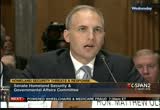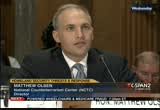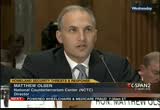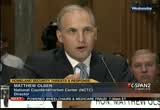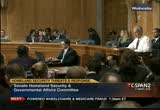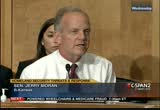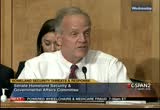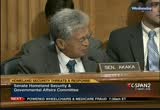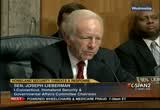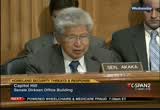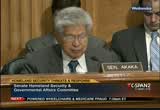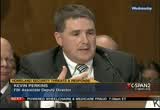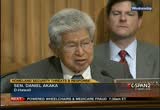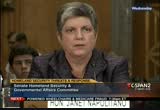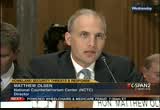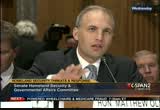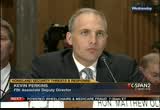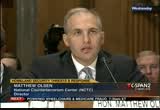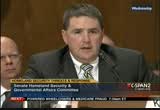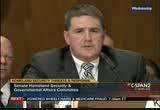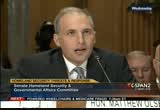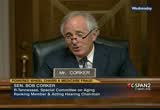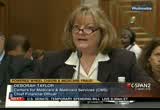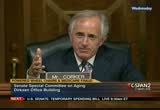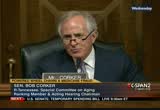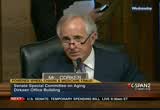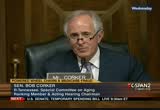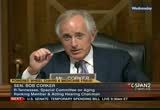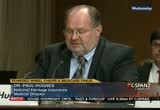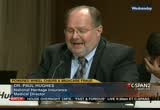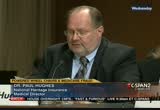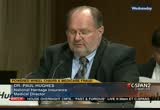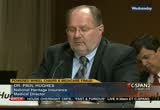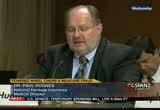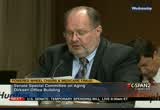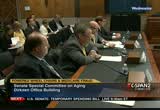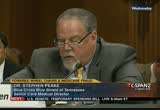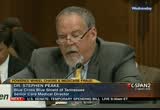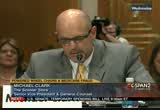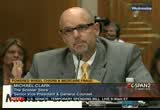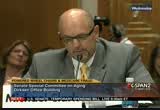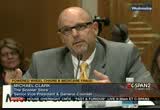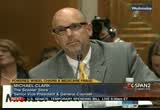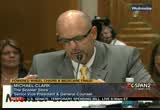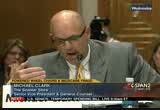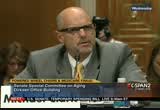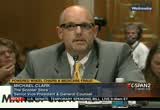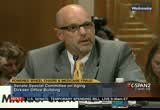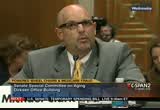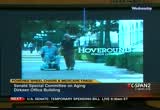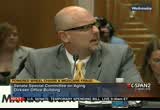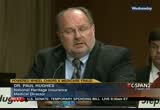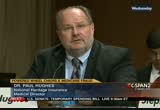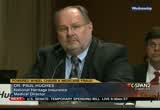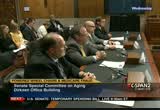tv Today in Washington CSPAN September 20, 2012 6:00am-9:00am EDT
7:00 am
months. it's a matter of a few weeks before this needs to happen him is that true? >> that's my understanding as well. so what i would hope to do is pull together, and i know some of you will be back here in your own states, but it can be done by conference call or people still back your but i would hope to pull something together in the next couple of weeks. >> i spoke with governor brownback last evening. i spoke with him on the phone this morning during this hearing. his request of me to you is that he will be on a plane today, tomorrow, at your earliest and fenians to reach an agreement in which he will sign the transfer and will release the $40 million. >> we will be in touch with your office over the next few days to schedule such a meeting. >> i appreciate that. thank you. thank you, mr. chairman. >> thank you. now senator akaka.
7:01 am
a personal privilege before a call on senator akaka. this happens to be the day on which senator akaka will chair the last hearing of his subcommittee on oversight of government management federal workforce in the district of columbia this afternoon. senator akaka has really given extraordinary leadership to this committee, and worked particularly in a way that really is unsung but very important on human capital managers of the federal workforce. and he will be concluding 36 years of service to the people of hawaii, 22 in the senate in the house, and retiring at the end of this year to spend more time with, what i take to be, to the three great loves of his life. his beloved wife, his family, and the island paradise of hawaii. millie and danny have four sons,
7:02 am
one daughter, 15 grandchildren and 16 great-grandchildren. not bad. he is much loved here in the senate, and in hawaii. he's accomplished an enormous amount in his time he. i just want to express to him, not only my gratitude force friendship and what an honor it's been to serve with him, but as chair of the committee to thank him for his steadfast and principled work on this committee year in and year out. and since i'm going, we are going out together, so to speak at the end of this term, one of the benefits i hope, danny, is i hope i'll have time to visit you in hawaii more often, and expecting that i which is, as i turned over to you, say aloha. >> not bad for a yankee from new
7:03 am
england. that is terrific. thank you very much, mr. chairman. thank you for your words and i'm glad that we are stepping out of the senate together. , enjoyed working with you very, very much throughout the years. i want to thank you and ranking member for your leadership of this committee, and in the senate. and you continue to do great work, so thank you very much, mr. chairman for your words. and thank you so much for holding this timely hearing. want to join all americans in morning the loss of the four brave and dedicated american public servants who died as a
7:04 am
result of what we consider senseless attacks in libya last week. i honor them and the thousands of civilian federal employees overseas who risk their lives everyday in service to this country. we all of a debt of gratitude to those who have made essential contributions to fighting terrorism and fighting against it. in the face of domestic and international threats, we really rely on these workers to keep us safe. in and we will continue to try to help these workers. and also i want to commend the
7:05 am
departments of our witnesses for your increased efforts for protecting our nation against terrorist attacks and for your partnerships that you have been bringing about so that we can have the best kind of efforts made for our country, and also for the training of the 230,000 law enforcement officials to help in this effort. and i want to commend you for all of that. at my request i want to tell the panel that gao issued a report last week that highlighted
7:06 am
troubling vulnerabilities in the security of radiological materials used in medical facilities across the country. terrorists could steal these materials and build a dirty bomb that would have devastating social and economic consequenc consequences. my question to the panel is, what is your reaction to this report of gao? and what are the current threats regarding terrorist acquisition of radiological materials? >> senator, i'll start, and again, thank you for your years in service to the country. with respect to that report, it's primarily medical
7:07 am
radiological material. the department of energy has the responsibility for the security of that material and how it is handled. so we are reaching out to them to see what steps they intend to take with respect to those medical materials. and will be happy to report back to you. >> senator, as well i would like to thank you for your years of service. and in answer to your question, what i would say as a general matter is that we do have at nctc a significant element with an organization, analysts who are focused solely on radiological chemical our logical weapons and possibly of terrorists obtaining and using those. and we work closely with the national counter proliferation center in that regard, as well as with our domestic partners, represented here, and the cia
7:08 am
and other agencies that focus overseas. it's of a significant concern for us and again i'll look forward to working with secretary napolitano and the fbi on this issue. >> thank you very much. >> senator, and i, too, congratulate you on your years of service and service to the country. i reflect what madam secretary and director olsen both stated. we have a weapons of mass destruction directorate that works closely with the department of energy, with composed of dhs as well as nctc, and tracking, following, and trying to be in a mode where we are able to detect any thefts along those lines. we will have to have some time to review the factual aspects of the gao report and get back to you on that, but we work closely
7:09 am
with our counterparts in these agency, as was the department of energy to mitigate those threats. >> thank you again for your partnerships. it really shows. as you know, secretary napolitano, as you know the senate failed to pass comprehensive cybersecurity legislation prior to the august recess. because the process of the legislation here are damn, i support the personal use of his authorities to improve cybersecurity of the nation's critical infrastructure such as the power grid. my question to you is, what are the contours of executive auditor currently under consideration?
7:10 am
and what do you expect it will be, when will it be expected to be issued? >> senator akaka, there is an executive order that is being considered. it is still being drafted in the interagency process, but i would say that it is close to completion, pending a few issues that need to be resolved at the highest levels. and, of course, the president will need to be involved. perhaps it's easier to say what can't be in an executive order as opposed to what can be in an execute order. we still did cyber legislation, still want the congress, and appreciate the efforts everyone has made in this regard. this is something that the congress should enact in a comprehensive fashion. we've come close but we haven't been able to get across the goal
7:11 am
blunder, but it remains an urgent need. there are at least three things i can think of just off the top of my head that an executive order cannot solve. one is it cannot solve some of the limitations we have on personnel and personnel hiring and salaries and how that works. it cannot solve the issues about liability protections, which are often viewed as a mechanism to foster timely and effective information sharing. and it cannot, we cannot buy legislation increase criminal penalties for the bad actors that we find or that the fbi finds. so those are at least three important areas that even robust eo would not be able to cover. >> thank you. thank you very much. my time is expired, mr. chairman. >> thanks, senator akaka. let me pick up on the line of
7:12 am
questioning by senator akaka. i appreciate that report, secretary napolitano, and i'm glad the administration is going forward with a sense of urgency about this because it's possible that we'll be able for a variety of reasons to adopt cybersecurity with legislation in a lame-duck session, but, you know, i agree with senator akaka, based on what we've been through up until now i wouldn't count on it. i will be obviously quite pleasantly surprised if we are able to find common ground, and we're still working on. we still have bipartisan discussions going on. but with the probability of the failure of congress to adopt the cybersecurity act of 2012, or something like it, i think the sooner the executive branch is ready to try to fill whatever
7:13 am
gaps it can, the safer the country will be. so i appreciate that. i certainly, i take this to be what the pace of work in the administration is so i'm not saying anything that is at odds with it, but i certainly wouldn't want to see a lame-duck session works out. in other words, if we get something passed then it will presumably overcome the executive order. and as you said there are at least those three matters that are in legislation that the president cannot adopt by executive order. i assume, but look for reassurance now that you and the department of homeland security are quite actively involved since you are charged with using responsibility for cybersecurity in the construction of a possible executive order or orders regarding cybersecurity. >> mr. chairman, yes, we've been very actively involved, as have
7:14 am
some of the other agencies who have primary responsibility in this area. so i think that more and more people, and one of the benefits of the legislation, even though it didn't pass, is it helps begin educating people as to the really considerable civilian cyber responsibility and capabilities that are already being exercised by the department of homeland security. and i think that any executive order will reflect that as well. >> do you know whether the executive order is considering the possibility that we looked at in our own legislative work here that there are, even though we ended up with a proposal that would have made compliance with the standards voluntary, and i understand president by executive order can't make them mandatory, but that we look at the possibility that under
7:15 am
existing statutory authority areas regulatory agencies might have the existing authority to make whatever standards emerge mandatory on the sector of the economy that they oversee? >> mr. chairman, without talking in detail because things are still in draft -- >> sure. >> and the like, but i can tell you that there's been a deep dive into the sector specific analysis as to where there may already exist some powers. >> okay, that's good to hear. i'm encouraged by the. let me give you an opportunity one more time to rebut what seems to be driving a lot of the opposition to the bill, which is, this will be the heavy hand of government over the private
7:16 am
sector that controls critical cyber infrastructure. even though in the non-cyber infrastructure, primarily non-cyber, the 18 areas that are designated now which dhs has authority over, you are working really quite constructively and collaboratively i gather with private sector in each of those areas. so what more do you think you, and we can do him to reach her private sector that this is intended to be collaborative, not coercive? >> well, i think, mr. chairman, we think, i think we need to continue, it is prologue to the future. that we have more collaborative on number of areas outside of cyber and affecting critical infrastructure. and that they themselves benefit if there are shared standards.
7:17 am
and quite frankly with respect to court vertical infrastructure many businesses and communities of families rely on the core infrastructure to be safe and secure. so that in and of itself elevates it to a different plane. we want to be collaborative. we think that's the way to go. is truly public and private and contemplation and then current activity. but again, a significant gap anywhere with respect to core critical infrastructure can have ripple effects far beyond the individual entity that is the control. spent a great part director perkins, do you want to add, fbi has developed really impressive cybersecurity capacities, obviously particularly with regard to domestic law enforcement. i take a you are involved in a possible executive order?
7:18 am
>> yes, mr. chairman, that's correct. we're working with our partners at dhs to affect that end. and i echo to some degree what secretary napolitano was talking about as far as the efficiency. we have to the partnerships to make things work. in the many things the fbi does partnerships make our work efficient. we are in cybercrime and cyberthreat partnerships are essential more than efficient. they have to be there in order for us to carry out our mission. so looking at the past, looking at the success we've had with the partnerships in the private sector, we hope to play on that going forward to when the confidence and to get this type of, whether through legislation or executive order to pass it, our ability to carry out our mission. >> okay. my staff just handed me a note that said reuters, the new service, it's is reporting that
7:19 am
the bank of america, the bank of america's website has suffered intermittent problems on the internet that a group was planning to launch cyber attacks on the bank and the new york stock exchange again, in retaliation for this film. do any of you know anything about this at this point? >> mr. chairman, there has been some ongoing activity, attribution, whether it is retaliatory i don't think has been determined. without going into more i would just simply say that this is an example of where working public to private to private benefits everybody. >> director olsen or director perkins, do you want to add anything? >> i would just add we were family with these reports as of last night. so the have been ongoing efforts in this regard. >> yes, sir. that's accurate.
7:20 am
we are working with dhs, beyond that point right now i really can't share a great deal of detail on it, as we look into it. >> good enough. it does make the point again, this is a news story i'm going from, but there some legitimacy to parts of the although not clear whether it's related to the film. but it does make the point that we've been trying to make in the cybersecurity legislation that we are in an unusual circumstance. we are the target of an attack by an enemy, with a nationstate or a terrorist group, would just as likely, in some sense, more likely be privately owned cyber infrastructure that controls some significant part of life in america as opposed to attacking a military target or a government website or something of that kind. so okay, i want to move to
7:21 am
another area. and that is, the extent to which over the last year or so the irgc could force from iran, its plans, particularly hezbollah have attempted to perpetrate a number of terrorist attacks in countries around the world, again most recently the successful terrorist attack on a tourist bus in bulgaria, but obviously again we know that last year the government of iran apparently attempted to carry out an attack here in washington against the saudi ambassador using a member of the mexican drug cartel. i want to ask if we do, what, first to put this into context. my impression is that the iranian revolutionary guard corps and the quds force has
7:22 am
made a strategic decision to move out of their immediate neighborhood and to begin to operate internationally. am i correct on that, director olsen? >> what i would say, mr. chairman, is that we have seen an uptick in operational activity by the islamic revolutionary guard force and the quds force over the last year or so. and certainly to your point, the plot against the saudi ambassador in washington last fall highlighted a willingness of iran and its terrorist elements to actually carry out, seek to carry out an attack inside the united states. >> right. and what i'm wondering is, am i right, my impression certainly is, whereas the traditionally the irgc, the quds force that
7:23 am
operate within the middle east, hezbollah, and iraqi shia militias, obviously in iraq, that now they seem to be spreading out more broadly. the two cases we know are the u.s. and bulgaria. is that, is that -- >> well, i would say that your impression is consistent with my own. insofar as certain we've seen iranian influence in iraq and in afghanistan, but we've also seen links between iran and terrorist operations in india, thailand, georgia. so is a threat that is beyond the immediate region of iran. >> so let me ask any of you, to what extent now this expansion
7:24 am
of terrorist activities sponsored by the iranian government rises as a threat to our homeland among the other terrorist threats to our homeland? >> i'll take that him at first. again, you mentioned, and i discussed briefly, the planned attack last fall, so it is, i would consider it to be a significant source of concern for us, both iran and its terrorist element, the quds force, along with the group it coordinates with, hezbollah. >> i agree with director olsen, in that quds force, hezbollah and others have shown they both have the capability and the willingness to extend beyond that region of the world, likely here in the homeland itself. we look at it as a very serious problem.
7:25 am
we look at it as a serious threat, and that we are focusing intelligence analysts and other resource on that on a daily basis to monitor the threat to make determinations, increasing, dropping off, i agree with director olsen that they -- to have the capability and they have the willingness to do that, which is two very important steps. >> obviously you are coordinating with other parts of our intelligence community, that have unique responsibility for intelligence outside the u.s.? >> that's correct sender. and a key point that this is a whole of government approach in dealing with this, a very key across the entire intelligence community both outside the u.s. as well as here in the homeland. >> okay. let me go to aviation security, which over all post-9/11 has been an area where we put tremendous research into the
7:26 am
battle -- resources into the battle and overall we have successfully defended our country and the enormous number of people, americans and non-americans who traveled by air. you offer testimony that al qaeda in the arabian peninsula, nonetheless, continues to show and intention to attack american and international aviation systems. i wonder, i would begin, secretary napolitano, with you. apart from your statement in your prepared remarks, are there additional steps, are there some that you'd like to highlight at this point which you think we can or should take to deter or detect future attacks on our aviation system's? >> well, i think the whole aviation sector demonstrates you
7:27 am
have a layered approach so that if someone or some group is able to debate one letter, another letter can pick them up. but it became fundamentally with good intelligence. good intelligence sharing with our international partners, good intelligence within the aviation sector, good intelligence sharing among the federal family. it goes to the standards that we require for planes down for the u.s., both for passengers and for cargo, and how we inspect those standards. it goes to what we are -- what we ourselves require of airports and airports authorities that control the perimeter of the airport. without one or or two incidents of breach this last you. we've jumped on both of those to see why and what directed measures need to be taken. it goes to what you get into the airport, what you see in the area before you get to the gate, which you may not see in the area before you get to the gate,
7:28 am
the construction of the gate itself with the new technology. and then things that we're doing in those so-called sterile areas were even though we call them a sterile area there's still a lot of work underway and different things that tsa does on different days at different times at different places to increase security. so it's an entire layered approach. one of the things i think has really helped, and i think american passengers will begin seeing the benefits if they haven't already is moving to a risk based approach where, if we have pre-knowledge of a traveler and whether biometrics, they will, they are able to go to the airport, go through customs more quickly. so we are really encouraging that. that takes pressure off a line. the second thing that's going on is a lot of technology research to cf in this country where we
7:29 am
of the world's best and engineers we can devise a system even more efficient to travelers and yet deals with the evolving threat. research cycles take time, but there is very interesting work underway in that regard. >> director olsen, director perkins, do you want to add to the? >> first in terms of the threat, i know we've touched on this briefly, but we do see from al qaeda in the arabian peninsula that they have demonstrated its desire to carry out attack involving the aviation sector for the three failed attempts since december of 2009, including one just this past may. i concur completely with secretary napolitano in terms of developing a layered approach, in terms of contribution to that effort, we maintain the identity database of known and expected -- suspected terrorist which has become the basis for watchlisting, at least in parts of the types of screen that can
7:30 am
take place at airports. and then finally i would highlight again the point that secretary napolitano made by the valley of intelligence and developing at the earliest possible stages assigned communications and information about individuals who may be seeking to carry out this attack so that we can disrupt that type of plot, before the person ever gets to board an airplane or goes to an airport. >> mr. perkins'? >> mr. chairman, i echo their comments. i agree that aqap is one of the top if not the top threat we face right now, simply because of the active willingness to continue coming at us in that way. i echo director olsen's comments as far as intelligence goes to one of the things we've done recently to enhance and build our intelligence capabilities, especially in our counterterrorism division, is a better integration of our analyst. recently we have named three deputy assistant directors who
7:31 am
are all intelligence analysts, non-agent personnel, intelligence analyst to leave those efforts within the counterintelligence, counterterrorism criminal investigative division. so focus on intelligence ahead of time as well as layered approach to thwart these attempts is vital. >> so you said something just now that anticipated the following question i was going to ask, which we are in the context as you said were al qaeda, the core al qaeda which was responsible for the 9/11 attacks on america has been greatly weakened. bin laden is dead. a series of people who have worked their way up to replace others are gone. al libby is now gone. al-zawahiri unfortunately remains at liberty but i'm sure he's in our sights nonetheless. so if i asked you to give me
7:32 am
what you would rank as the top let's say two or three, i'm getting here and now, to do with the islamist terrorist groups. what you list as a top two or three threats to the homeland, what would you say? director perkins the music you might input aqap now at the top what else? other groups? iran, quds force, which? >> obviously quds force, hezbollah a lot depends on future coming in, world events asked where exactly that goes. as we echoed, while they have the capability and the willingness, that puts them near the top of that list as well. other imaging threats and other parts of the world that we look at in addition to aqap, some of
7:33 am
the west africa, east africa, threats and those regions. as far as their actual extent a threat to the homeland thursday in those areas. nonetheless, those are things that are of the top of our list to follow as they emerge. >> director olsen, how about you? what are your major concerns about sources of threats to our homeland? >> in terms of the threat to the united states homeland i would aqap at the top the list but i would also put again a few core. not within its greatly diminished capability, it has retained the intent and we've seen this to carry out an attack even if it's a smaller scale less sophisticated attack and we've seen in the past to against the u.s. homeland. and in third, these are not any particular order but i would also put iran and hezbollah at going to comment about the likelihood of attack inside united states depends largely on
7:34 am
events in the middle east and what we see the understood. secretary? >> i would add to what was said of the nature of homegrown islamists terrorists or terrorism, what we saw, for example, the arrest in chicago last saturday. i think it was saturday, of an individual. we have seen a pattern of this for several of these incidents over the last year. i think the internet serves as a facilitator of that, and i think the so-called lone wolf can also be a loan islamist in that regard, motivated by motivations that may be behind, for example, what occurred in benghazi. >> okay. well, i think you, the three of you, very much. again, we have made great progress. i think the american people have reason not only to be grateful for you, all the work you do, for our increased security in
7:35 am
the face of an unusual, unprecedented threat to our homeland security. unique really in american history. and we're not only improving our defenses, we are on the offensive in a very real way. but the threat goes on and so will the work that you and this committee will continue to do so, so i thank you very much for the record of their and will stay open for 15 days for any additional statements or questions that you are members of the committee have. director perkins, you can tell bob moore that he doesn't have to appear any more, that you have done very well. he can just stay at the office. okay, with that, thank you. the hearing is adjourned. [inaudible conversations]
7:36 am
>> office we can booktv's live coverage of the national book festival from the national mall with today's of author presentations and interviews including walter isaacson, david mayors, and your phone calls, tweets and e-mails. live on c-span2. get schedule details at booktv.org. >> this thing of the senate special committee on aging looks into the high rate of fraudulent medicare reimbursements for powered wheelchairs. a family physician testifies that he a company seems to appointments using aggressive tactics to get doctors approvals for the device. will also hear from executive and a company that the wheelchairs. this is just under two hours. >> i think will go ahead and get started, and thank you very much for being here. all of you who have come to this hearing.
7:37 am
instead of reading my opening statement, i'll start by saying that some time ago i watched a great deal of television. i would see, see ads on television regard all kinds of mobility devices where people could, it appeared, just call up and the companies would figure out some way for this person to own these mobility devices with little or no money down. it almost gave the impression that that would ensure that you paid nothing for that. opposite that's taxpayer money, and it looked to me to be very flagrantly in the face of anything that would have value for the american taxpayer. and it also seemed to me that people were taking advantage of this, and probably jeopardizing people who really do need these mobility devices down the road. so our staff began looking into it. we have learned that through cms
7:38 am
have like an 80% default rate on these. in other words, that 80% of the people who apply for these mobility devices get turned down initially anyway. and so there's a huge problem here. i think most americans have seen these advertisements on tv and probably question what the federal government is doing. i certainly do. it's actually, well, i will just live at the. i know we have a new program now that, through cms, that's going to look at this and try to get that fault rate down from again 80% to some normal level. so we have a program that is being advertised to the american people, people are applying for it, lots of people are receiving these mobility devices but we have an 80% case of these devices not meeting standards. so now we've hired contractors, i understand, to deal with it.
7:39 am
these by the way are the same contractors we have been working with in the past on this same program. so the purpose of this hearing is to look into that and to ensure that we as a government are going to do those things and responsible as relates to these mobility devices. so i thank you all for being -- i might add by the way, this is the same entity that will be dealing with all kinds of the responsibility, especially as we move forward with the new health care bill. so i think this is something very timely for us to look at. i thank you all for participating to am going to go ahead and mention to all the participants are. deborah taylor is the chief financial officer and director of the office of financial management for cms. we thank you so much for being here. later on on penalty we'll have paul hughes, who is a physician in the medical director for the national heritage insurance company. durable medical equipment medicare administrative contractor.
7:40 am
responsible for jurisdiction which is comprised of states from maine to washington, d.c. would also have stephen peake, ph.d, is a medical director and in the i might add, medical director for the senior care division at blue cross blue shield of tennessee. we have michael clark, jd, chief administrative officer and general counsel at the scooter store. i think this might of been the entity that i continue to see these advertisements with. and then jerome epplin, indeed, was a family practitioner at the litchfield family practice center in litchfield illinois and also trained students in southern illinois university. and 2010 receive the american geriatrics society clinician of the year award. now that i filibustered by introducing a but on the front and hoping that some of my colleagues would be your, if you would go ahead and start i would appreciate it and certainly the meeting is now in order.
7:41 am
>> good afternoon and thank you very much for the opportunity to discuss the centers for medicare and medicaid services efforts to reduce fraud and improper payments for power mobility devices and to update you on the prior authorization demonstration which cms began earlier this month. power mobility devices, or pmd is, historically have high incidence of fraud and improper payments. the suppliers of pmd is continue to be subject to significant law enforcement activities. joint investigations by the department of justice and the hhs office of inspector general and cms have resulted in numerous suppliers being charged with defrauding the medicare program. recently in a supply was sentenced to 180 months in prison for participating in a scheme that defrauded medicare of $121 million for building for powered wheelchairs and other medical equipment that was never
7:42 am
provided to beneficiaries. in addition the oig, and you mentioned this, and a comprehensive have results that more than 80% of claims for motorized wheelchairs did not meet medicare coverage requirements. although cms recognizes that many improper payments are not the result of fraud, this air raid is extremely high. in an effort to prevent dollars from being wasted and protect the medicare trust funds from fraud seem as began this pmd prior authorization gambled for orders written on or after september 1, 2012, for m.e.d.i.c. north and fishes who reside in seven states. this demonstration will employ private authorization, use private sector tools to prevent the medicare trust fund to prior authorization sometimes known as prior approval or precertification is currently used by other health care broken such as tricare, some state medicaid programs, and private insurance plans for many
7:43 am
services including pmd's. with prior authorization cms review the medical records before this is a part delivers the pmd. this allows suppliers to know before a night of his liver to a beneficiary whether medicare will pay for it. this does not create any new documentation requirements but simply requires a medical information be provided before submitting the bill for payment. the demonstration can also help us develop improved method for the investigation and prosecution of fraud that could ultimately protect the medicare trust funds from fraudulent activities. this prior authorization download will also venture that a beneficiaries medical condition warrants the penalty under existing coverage guidelines. cms did seek input from any provider and supply groups on this demonstration. when we originally announced on november 152011.
7:44 am
we received significant feedback from the industry. in response to that feedback we did delay the demonstration by nine months from the original january 1, 2012, start date. cms also made several other changes such as reducing the recent mission review time from 30 business days to 20 business days, and allowing suppliers to submit the prior authorization requests on behalf of the physician. in addition cms conducted and will continue to conduct education and outreach activities including webinars, open-door forums and in state meetings. cms will closely monitor the demonstration and will continue to work to ensure that suppliers, physicians and beneficiaries have up-to-date information about the demonstration. prior authorization can be an important tool to help cms reduce fraud and improper payments for pmds will continue to ensure that beneficiaries have access to
7:45 am
needed equipment. we believe this demonstration will help protect the medicare trust funds by utilizing many of the same methods offer to use by private insurance plans to ensure payment accuracy. i'm happy to answer any questions you have. >> thank you. what was the impetus to create this new pilot program that you're now putting in place? >> part of the evidence was the fact that we continue to do education and outreach for providers and suppliers of these pmds. we have conducted lots of prepayment review to ensure that they understand the policies. however, we continue to still see high rates, over 80% with this benefit. and as i mentioned we continue to have fraud committed against the benefit by suppliers throughout the country.
7:46 am
so we felt that this was the next step that we really wanted to look at something private sector uses currently to ensure that we are paying for wheelchairs that are really needed spent and i know many of the questions that whoever is he will ask will be a the second down, people that are very directly involved, and i know you're not. i know you're trying to solve problems, but what is, i mean, 80% is a huge number. as a matter fact how much do we spend on pmds annually? what is your estimate? we have one ourselves. >> in 2011 we spent a little over $700 billion on power wheelchairs. >> and 80% of the claims for those as it turned that were inappropriate as it relates to cms standards? >> correct. on our review, documentation or additional information or the fact that the beneficiary did not need the pmd was what we found when we reviewed those claims. >> i mean, it seems like any
7:47 am
american that would see one of these commercials on television they would realize that something probably really bad is happening here. and you guys have evidence that 80% of the claims shouldn't be there in the first place. so what is it that it takes to reate huge alarm bells when we have this kind of money being wasted, being utilized in ways that it's not supposed to be utilized for? >> conversations we've had with beneficiary groups, as we have started to roll out this demonstration, we continue to emphasize to providers as was beneficiaries that the medicare program under the statute and by law pays for power wheelchairs for use in the home, for beneficiaries who need a wheelchair to get around their home, to perform an activity, one or more activities of daily living such as going to get
7:48 am
food, going to the bathroom, and when we explain that to beneficiaries, i would say many of them are surprised that it is for use in the home. and that is by law. it's under statute that that is the use for a pmd. and so i do think some of the commercials may be confusing for beneficiaries when they see the primary use for wheelchair outside the home. that's not the primary benefit that we cover under medicare. >> and it's my understanding where using the same contractors that we've used in the past where we've had this 80% error rate. we are using the same contractors on this pilot program, is that correct? >> correct. we're using our durable medical medicare, medicaid contractors for these reviews. >> had a talk with any of the contractors themselves just on the one basis, ask them how in
7:49 am
the wealth they could have an 80% default rate in what they were doing? >> yes, we actually talked to her contractors probably quarterly to talk about what they are seeing, and more often if needed. i know that we have one of those contractors on the next panel, but, you know, most of it does come down to documentation. we require a seven element form to be filled out by the physician as well as a face-to-face examination. often times one or two of those items is missing from the medical records. so it's really almost impossible to know what did the physician see what did they observe when they saw that patients. so when documentation is missing it's very difficult to determine what was going on in that examination. >> but isn't an 80% rate almost beyond belief, even for the federal government?
7:50 am
>> its extremely high, yes. >> have there been any, i mean, that high rate would almost make one consider whether much of this is being done on purpose and whether there is actually other kinds of activities that are fallacious in nature and may be what there ought to be proceedings in other ways. have you all considered looking into that? >> from our standpoint we believe the prior authorization demonstration will be a great tool for us to look at. right now on an annual basis, the products that are covered under this demonstration last year, or in 2010, we had about 200,000 claims billed for these products. we looked at very few of those claims. we don't have the budget or the resources to review a law. this would be the first time we will have, in fact, the records and documentation up front for about 40% of those. so we think the prior
7:51 am
demonstration will, in fact, provide us with a lot of information to get exactly what you are saying. one of the things we should be looking for, is there, you know, patterns of fraud here that we should be looking for. >> so if i understand correctly, cms, which spends billions of dollars each year on durable medical equipment, doesn't have the staff or the resources to actually look at these authorizations in advanced in most cases. so when people, sometimes you think you are hearing folks rhetorical talk about the waste and fraud and abuse that takes place in medicare. which you would say is that just in this one case, 80% of the claims are off. you think it's over $700 million. this is just one minute case is pending within the medicare allotment, and you were saying that cms would doesn't have the resources to know whether that is being carried out throughout
7:52 am
the system, is that correct? >> correct in some level. for me, we do look at it. we do look for patterns. we are a provider or a supplier may look average so we do folks and not. but in the grand scheme of the entire medicare program, we have to focus our efforts on the highest dollar dispersed, so that is what we tend to focus our resources. we have enough money to look at less than 1% of the claims that are submitted to medicare each year so we really do have to use resources sparingly and we really think this prior off demonstration will give us the opportunity to really look at this benefit a little closer than we have been able to do in the past. >> so we look at 1% of the claims, vast amount of money. so when people talk about hundreds of millions of dollars
7:53 am
in waste, fraud, and abuse existing and medicare, just this one example would lead people to believe that that really might well be the case, is that correct? the number has to be huge if we're finding in this one little $709 program to 80% of the claims are invalid. >> we do a major, comprehensive management on the entire program and last year it was less than 10%. nine-point something. so on the entire program we do to a measurement. we cannot determine how much of that is fraud, but we do know that we do have an error rate in the medicare program of around 10%. >> what would you expect would be an appropriate rate? do you think of the tremendous improvements? again, we're using the same
7:54 am
contractors in the past that generated an 80% fault rate. so we're using the same people. which is using a little different process. i would've thought some of them doing so much visit with the federal government would've volunteered that this is a problem, and i look forward to asking some of those questions later. but what is the rate that you expect, that 80% rate will be what rate in your estimation? what do you think will be a good job, if you will, by his contract after this pilot is in place? >> we are in the process right now of acquiring and evaluation contractor for this demonstration. we certainly are going to look at the quality of determination, the quality of information sent into us by providers. i don't think we have set a threshold of what is an acceptable ever rate. obviously, we would want an ever rate to be zero.
7:55 am
that's probably very aggressive given where we are now, but right now we sort of need to start the program and evaluate it along the way to see what steps or actions we may need to take to tweak it. but we expect to quarterly meetings with our contractors on what they're seeing inside the prior authorization demo, and will have an evaluation contractor looking at the entire program to give us information feedback on it. >> so we set up a program to do with an 80% error rate, one that any american with any kind of ability to comprehend can watch on television and understand that there's probably achievements amount of abuse taking place in a program. so we have this program that hasn't 80% error rate, and we put in place a prior authorization, pilot, but we
7:56 am
haven't yet figured out what our goals are as relates to an air raid, and we're going to hire another contractor who is an evaluation contractor to help us figure out what that ought to be? >> we are going to need some resources to help us analyze the data. so the prior authorization is one part of this. when you look at fraud, if someone believes we're looking at them, they are likely to move. so the entire benefit will have to be evaluated under this. at this point i think it's too early for me to protect or to say what our hope is, the ever rate would be. we certainly will evaluate that and that would be sort of one metric of success of this program. >> well, first of all i think you, and it sounds like to me that you understand there's a
7:57 am
problem and it sounds like you may be under resource, and i look forward to digging into that a little more. really appreciate you being here today. but i think, you know, just outside observers watching this it would be almost, you know, beyond belief to realize that this has been occurring this long and we really don't in advance have some standards. how would you feel about us, and we know more about this, dig in the low more and have this hearing, how would you feel about us putting into law, i think the american people would fully stand behind this, but putting into law that every contractor has an air raid about x., they are no longer a part of a program. would you feel like that would be helpful to help reinforce what it is you're doing? >> we currently do have some metrics in our contractors awards and contracts with signed
7:58 am
with them that they must've efforts to reduce the error rates. we typically look at it as a whole but it is really something we would consider and would be happy to talk to this committee about. >> so with the contractors who are getting ready to testify with us, and you know who's on the panel, you deal with them, who have an 80% error rate, they had in their contracts provisions that say that they need to help you throughout ways of lowering the error rate come and get we continue to re-up with and even though they have an 80% error rate. >> it is extremely difficult to be able to look at every benefit under a contractors purview. we do work very closely with our contractors to make sure they have, you know, actions to deal with these and to mitigate them. and so, you know, we do work
7:59 am
very closely with him to make sure that they're on top of it and are taking actions to correct it. >> can you understand why these desperate why i am semi-astonish where we are today? >> yes, i can. >> i think most americans realize that we had agencies of government that continues year after year after year to deal with people that had an 80% error rate, and we had in their contracts only that they're supposed to help us figure out ways of mitigating that adler and that, and that still hasn't happened. and then we're putting in a prior authorization program now that is a pilot using the same contractors, and that we didn't have yet a standard by which we felt like they should live to our not be a part of the program. i think, i think it would be
8:00 am
just incredibly astonish and i just want to make sure, i know that i am now, that i am not missing something here, that maybe there's something else you would like to say. >> i think for the contracts there are many things that are contractors do. ever rate is one piece of the contract. we do expect him to do education and outreach. unfortunately, that education and outreach is not having the impact we hoped it would. prior authorization is a tool that we think can help significantly lower the error rate and also identify and help us identify fraud that could be occurring inside the benefit and help us figure out additional things that we may need to do to prevent it. ..
8:01 am
>> how they could have one that's negligible, i mean, almost steer, and stanf could have 1% of the claims, and, again, we're using the same people that are grading this problem and trying to fix it. and i'm just wondering if you could share some of the differences there. >> i really can't speak to the tennessee mel, but when we look at what other private insurers do to measure ever rate, they typically measure it on the claim as paid. when we do that same analysis, we pay appropriately based on the information that's on the claim 99% of the time correctly.
8:02 am
it's when you require as the physician or supplier to send in the underlying medical record that we find the ever rate shoot up to the 80% that we've been talking about. so when the claim is submitted and the claim is paid based on the face of the claim, we cannot look at the underlying medical records for every claim. we do, in fact, pay very comparably if not better than most private insurers. it's really when we pull the claim and request the medical record and look at the underlying record against our policies and our coverage requirements that there is information missing that would cause us to deny that claim for payment. so that's usually where we differ from private insurers. >> that's a very good explanation, and i thank you for your temperament. now that senator blumenthal's here, i'm going to turn it over to him and, again, thank you for
8:03 am
being here. >> thank you, senator corker. and my thanks to you for holding this hearing today and focusing on an issue that i think has not only financial and fiscal implications, but also really potential dangers for consumers and the integrity of the entire program and public confidence and trust in its integrity. and i want to thank senator kohl as well for his leadership. without belaboring some of these numbers, the oig reported in 2011 finding that 80% of the claims for power mobility devices did not meet medicare coverage requirements certainly raises urgent concerns not just strong, but also urgent concerns. and this error rate represents close to half a billion dollars in improper payments at a time
8:04 am
when we're trying to desperately cut or reduce the increasing costs of health care. so i appreciate your being here today, and i am really interested in what you can do and what you plan to do to address some of the direct-to-consumer ads. as attorney general, i'm very familiar with the potential for deceptive and misleading ads to consumers, and especially where you have such strong financial leverage and interest, my view is that you have an opportunity and an obligation to do more to restrict some of those potentially deceptive and misleading ads. could you tell us a little bit more what you can do to exercise
8:05 am
some leverage and authority? >> um, cms does not have authority to really oversee or to, um, regulate commercial direct-to-consumer advertising my suppliers for power wheelchairs or really any health care. delivery. what we do is we encourage that they not mislead or, um, put anything in their advertisements that is not correct. we certainly have herald as we've -- heard as we've been out talking to beneficiary groups that there's confusion as to what medicare does pay for under the power mobility benefit, and by statute, by law we can only pay for power wheelchairs when it is needed for the beneficiary
8:06 am
in their home to perform one or two activities of daily living. and so when advertisements do show the power wheelchair for the primary use of outside the home, it does create confusion for beneficiaries. but we cannot regular hate the advertisements that, um, these suppliers put out there. >> when you say you can't regulate them, i know you can't order them off the air, you can't restrain them from making those ads, but you can refuse to pay for power mobility devices that are produced by those companies if they result in inappropriate use or if the purchases result from inappropriate ads. >> i'm not sure we can do that. it's -- if a provider or physician sees a patient and orders the wheelchair, i -- and
8:07 am
it is necessary for the beneficiary even though there is an ad that's not appropriate, i will need to pay for the wheelchair that a physician signed an order for. >> so in effect, you're saying you don't have the authority that exists under the fda act that applies to a pharmaceutical drug marketer if it applies to a consumer an often accepted deny unaccepted use of a -- [inaudible] >> i can't now. >> well, would you like that authority? >> i really can't speak to whether i would like that authority or not. >> why not? >> that's really not my place to say that. we'd be happy to work with the committee, but -- >> so let me -- i understand your point, and i understand that you can't speak for the agency. let me put the question a
8:08 am
different way. that authority enable you to safeguard the use of taxpayer funds? >> it certainly would help not confuse beneficiaries about what the benefit is under the medicare statute. >> because i think a lot of taxpayers would be perplexed, to say the least, by payments made by the federal government for wheelchair devices that result from purchases induced by misleading ads when the government knows they're misleading or deceptive and does nothing and, therefore, is in the position of paying for those devices. and so i think that -- and i know there's a demonstration project, and i know that you're doing everything that you can or at least apparently so to deal
8:09 am
with this really very alarming problem. but i would like you to think about what we can do to enhance your power, your oversight is and your ability to intervene. i don't think it's so much a matter of regulation as simply oversight and stopping deceptive and misleading practices that result in waste and fraud. thank you. >> thank you, senator. and, again, i want to thank you for coming up here. i do want to say, and, again, thank you for your temper m. i know you're the person who's been sent up to deal with this. i think it's this, again, an 80% error rate, um, in any other
8:10 am
realm of society, heads would be rolling everywhere. i mean, no contractors would be involved, people involved within the institution, and i think it's this lack of alarm, lack of concern, lack of, you know, people hitting the roof over an 80% error rate that probably drives the american people crazy and loses trust, causes them toll lose trust in -- to lose trust in the u.s. government. and i would say rightly so. so this is of great concern to me, to look at this one thing that's so evident to everybody in america who watches even one commercial that these people put out that abuses are in place, and yet nothing really happens in a very rapid way. i do want to correct the record or at least have you respond later. when i asked you about the error rate at blue cross blue shield and medicare advantage and your response. it's my understanding they are listening, i was just handed a note that apparently the standards used by both medicare
8:11 am
advantage and you are the same. so the 80% error rate and theirs almost being known, they are equivalent in their mind. so if you would just, for the record, respond as to what you were saying because it appears to me there's a misunderstanding as to how we equate these things. it points to a morass, if you will. i know you look is after the big mbers, but this one jumps out at you so explicitly on a daily basis when we see the kind of things that people see on television, and yet people see these things undone, it just causes people, again, to lose tremendous faith in our government -- as they should when they see this. and i do hope that y'all will be absolutely on this pilot program. and i hope that you will terminate anybody in this program that has an unreasonable error rate. and i hope senator blumenthal and myself and others will figure out a way to pass some
8:12 am
legislation that says that if we have contractors who year after year after year have claims that are coming into you that have an 80% error rate, they will be banned for doing business with the federal government. thank you for coming in. >> and thank you. >> and if i may, senator, i don't know what you did to draw the short straw -- [laughter] but you've done very well, and we appreciate you being here. >> thank you. >> thank you very much. >> thanks. [inaudible conversations] >> so i think the next panel's coming up, is that right?
8:13 am
let me just, um, i tell you what, why don't each of you introduce yourselves. again, i introduced on the front end for a time, but why don't even of you -- each of you before your testimony state who you're with and what you do, and we welcome each of you to the u.s. senate. yes, sir. paul? >> hi, i'm paul hughes, i'm the jurisdiction dme contractor, medical director. i'm a family doctor by training and have been contractor, medical director for almost 18 years now. >> okay. >> so my statement? i'm dr. paul hughes, medical director for the durable medical
8:14 am
equipment. my geographic area is jurisdiction a, jurisdiction a is one of the four dmes and incomes maine to washington d.c. i've been the medical director for this region since 1995. i've worked for nhic which contracts with the centers of medicare and medicaid services. my primary responsibilities revolve around the development and implementation of medicare coverage policy. this role requires that i be involved in many aspects of nhic's operations including routine claim processing, medical review and provider education. i've asked to speak briefly about the preparations nhic has made to implement the prior authorization of power mobility devices demonstration project i'd like to separate the discussion into two parts. first, payment policy. reimbursement for power mobility
8:15 am
devices is set out in several sources. there are statutory requirements arising out of the medicare modernization act implemented by cms' final rule in 2006. these provisions require an in-person visit and a medical exam in addition to specific requirements for the cession of the prescription and the provision of these documents to the dme supplier. cms' national coverage quality creates the foundation for the medical coverage rules allowing for equipment assistance for patients with impairment abilities. that seeks coverage for all mobility equipment from canes and crutches to walkers and wheelchairs. to make a decision about which device is appropriate, cms national coverage policy requires the systematic evaluation of the beneficiary by their treating physician in order to determine which item optimally meets the
8:16 am
beneficiary's needs. in addition to this cms policy, the dme macs also have a local policy. this policy pulls together both the statutory and national policy requirements, organizes the nearly 60 individual power mobility codes into five groups of similar products, sets out the criteria for each group and explains the documentation requirements and coding guidelines. in other words, the other local policy takes information from various sources, adds additional details for proper claim submission and incorporates those into one document. the major concern i hear raised by suppliers is whether dme macs will be able to review the request volume in a timely manner. these requirements have been in place unchanged since 2006 when cms' regulation took effect. all dme contractors have performed numerous reviews on power mobility devices since
8:17 am
that time to identify problems. in addition to standard power wheelchair, we have all reviewed many complex rehabilitation power wheelchair requests under the advanced determination of medical cover average, usually referred to as admc. these complex products must meet the same basic coverage criteria as the products covered by the demonstration project. in addition to the requirements necessary to determine coverage needed to address the needs of these patients, this demonstration product does not change any of the rules. thus, we do not anticipate issues in this area. in fact, the projects focus on coverage criteria simplifying the review for our state. we do not anticipate that our review staff will have any difficulty in reviewing power wheelchairs of any type. another issue i hear mentioned is that some suppliers and
8:18 am
physicians may not be familiar with all of the policy requirements. the contractors have produced numerous educational resources ant this policy -- about the this policy ranging from physician letters and the need for quality documentation to question and answer articles, web fares and certain medical review analyses. cms' medicare learning network has also published a variety of materials addressing power mobility coverage. next, i would like to discuss operations. i know that some in the dme supplier community are concerned that the volume of claims may be too large to review in ten business days. based upon historical claim volume in jurisdiction a, we initially expect 25-30 new requests a day for the types of wheelchairs included in the demonstration project. in teation, we have increased our nursing staff and assigned
8:19 am
our more experienced personnel to handle the volume. based upon data, we anticipate that approximately 50% of the initial submissions will not be approved. likewise, based upon appeals data, we expect that about 50 percent of the resubmitted requests will not be approved. once the demonstration project is operatal and in full swing we anticipate a total volume of 50-60 new and resubmitted requests a day from this project. we have sufficient staff to allow flexibility to deal with variations in volume. in the nonreview areas, resources have been adjusted to allow for additional workload in written and telephone inquiries and in the mailing and production of response letters. finally, i would like to discuss errors. regardless of the source of the audit, types of errors are consistent. for example, our most recent jurisdiction a report published in july 2012 showed a charge
8:20 am
to -- [inaudible] rate of 64%. 33% had insufficient documentation. this includes both the failure to meet the statutory requirements, to perform the face to face exam as well as incomplete or poorly documented exam. 23% had problems with the element order. this is a statutorily required prescription. problems include el legibility and that the -- illegibility and that the prescription was completed before the face to face exam was completed. 98% were missing a financial relationship -- [inaudible] 14 percent had problems with the detailed product description. this is a document produced by the splayer for the -- supplier for the physician's signature. problems include no detailed product description submitted, and the items billed did not match the items ordered. be 9% had problems with the home ais accessment, either none was
8:21 am
submitted or was not signed and dated. 4% had problems with proof of delivery, either none was submitted, or the deliver delivery ticket did not match the claim. focused upon issues related to the quality of the physician documentation and the dme supplier. supplier's inability to get the proof. while physician documentation is an important factor, it is not the only one. off others are more within the supplier's direct control either because they create the documentation or because there is an opportunity to screen for mistakes and have them correct it before submission. in this most recent review, most errors fell into this latter category. this pattern of errors is not unique to this particular report. our review experience demonstrates that errors would drop significantly if attention were directed to some of these nonmedical record issues. in summary, i believe nhic is
8:22 am
well prepared to meet the requirements of this demonstration project. thank you for the opportunity to share this information. >> thank you, sir. mr. peake? >> [inaudible] ranking member corker, i appreciate the opportunity to appear before this special committee on aging. my name is dr. stephen peake, and i'm with med -- of tennessee. we have been offering this product in tennessee since 2006. we were established by congress in january of 2006, and we must conform to guidelines which are outlined in the cms manual, publication 100.16 which allows for increased flexibility in administering beneficiary benefits as long as they do not result in the beneficiary receiving less than traditional
8:23 am
medicare benefits. one aspect of this is the flexibility of reform utilization management which allows us as an ma plan to require prior authorization of services. we feel strongly that properly applied utilization management protects first and foremost the beneficiary from unnecessary risks. it also helps protect the system from fraud, and abuse. cms has previously mentioned has commented extensively on the documentation requirements for power mobility devices. yet cms continues to point out the majority of claims for pmds do not meet the documentation requirements for coverage. at blue cross blue shield of tennessee, we in the blue advantage require strict adherence to the documentation requirements as outlined in the cms literature. for example, coverage is allowed only if the beneficiary has a mobility limitation that limits
8:24 am
their ability to perform mobility-related activities of daily living in the home such as toileting, feeding, dressing, grooming and bathing in customary locations in the home, not elsewhere. the documentation must indicate the beneficiary's mobility limitation cannot be overcome with an optimally fitted cane, walker or wheelchair. in other words, do they require power mobility device? also it's required that the physician perform a face-to-face examination and, quote: shall document the examination in a detailed narrative note in their chart in the format they use for other entries. this is a requirement that is far too often not met. in addition, many suppliers created forms which have not been approved by cms. the one we mouth commonly -- we most commonly see is the texas academy of mobility evaluation. cms even commented this form was not adequate in the 2010 provider update, however, we continue to see suppliers
8:25 am
completing this form and having the physician sign it, and physicians are utilizing this form as the face-to-face mobility examination described above. in fact, if you go to their web site, it clearly indicates it's not a cms-approved form. in addition, the supplier must supply a detailed seven-part description but is prohibited from completing any portion which must be completed by the prescribing physician. yet again, we see what appear to be disparities on the form in the prescriber's handwriting. lastly, an in-home assessment must be completed to make sure there's room for effective mobility. as a primary event, it's to alleviate barriers to performance of daily living in the home, not elsewhere. in a one-year interval, blue cross blue shield of tennessee blue advantage received 397 requests, the majority of which were for the more expensive power wheelchairs.
8:26 am
ifif the initial request is denied, the supplier can request a reopening with additional information, both the prescribing physician and the beneficiary can appeal, and the prescribing physician can request a peer-to-peer discussion. by incorporating utilization management and requiring prior authorization of power mobility devices, 4% of them -- 24% of them were still found to not be medically necessary. in 2010 and now with the updated information of 2011 which is approximately 700 million was spent, based on you are experience -- our experience, that would be about $168 million in savings at 24%. we believe this savings could be significant. in conclusion, i personally applaud cms for initiating this demonstration project and would welcome it in the great state of tennessee. i appreciate the time you've allowed me to share on how we of
8:27 am
blue cross blue shield of tennessee's blue advantage -- and i welcome any questions you may have. >> good afternoon, senator corker and senator blumenthal, members and staff. my name is mike clark, i'm the chief administrator officer of the scooter store, a nationwide supplier of durable medical equipment including power mobility products and services. i have submitted extensive comments for the record and would like take this opportunity to summarize those comments for the committee. pmds allow patients to complete their activities of daily living safely and that they may age with grace and tig anity inside their home. pmds not only improve the lives of citizen, but they also prevent other serious injuries such as falls. in 2003 congress decided the payment may be made for a power wheelchair, payment may not be
8:28 am
made unless a doctor conducted a face-to-face examination and wrote a prescription for that item. the face-to-face examines properly places the doctor in charge of the patient's care. the scooter store applauds congress for emphasizing the role of the medical professional when assessing power mobility needs. congress' good intentions, however, have been stymied by a review process that place arbitrary constraints upon what constitutes the patient's medical record. for example, medicare will not consider at testations or letters of medical necessity provided by physicians who saw the patients face to face explaining why they've prescribed the item. the bottom line is there appears to be more of an interest in denying claims for technical documentation defisheries rather than determining where the patient actually needs the claim, the item. private payers handle the process be quite differently.
8:29 am
for example, under the prior authorization process utilized by blue cross blue shield of tennessee, a managed care program, 85% of the scooter store claims receive approval upon initial submission with an additional 10% approved after reconsideration or appeal for a total approval rate of 95%. in contrast, the medicare prior authorization program to date has denied virtually all the claims submitted by the scooter store. although the tss beliefs that prior authorization done right can be useful when several concerns about the program are currently structured. first, we believe that any prior authorization demonstration must be significantly smaller. um, simply put, this is a benefit proposal. by placing roughly 50% of the nation's medicare pmd utilization into prior authorization with no defined phase-in, no calibration between the physician who prescribed
8:30 am
these 1-3 a year for the part, no calibration between the physician and the supplier and cms is exactly what's needed. for example, we've had claims denied because the fact statements where the fax machine says the time and date, that there has to be a date and time. that's not being read properlly by the reviers, and claims are being denied for that. it's that type of calibration that will delay the problem, and it could lead to a disaster. under the current cms claims processing system, a beneficiary is provided his pmd or his or her pmd after a physician performs a face-to-face be examination. medicare contractors then, upon review, deny 80-90% of those claims upon review. the patient has the equipment in their house. what's not being discussed right here, right now is that there's a difference between a denial
8:31 am
rate in the final -- the error rate and the final denial rate. upon appeal, those denials are overturned through the waterfall of the appeals process 80-85% of the time. so the denial rate that's being reported is not the ultimate denial rate. it's just the error rate. um, under prior authorization demonstration project, the 80-90% is now going to move to the front end of the process, not the back end where the people already have the equipment. it now moves to the front end where they don't get the equipment. this place -- this involves problems in that there's no legitimate appeal right in this prior authorization project. you just continue to resubmit these to the same reviewer. um, the doctor's medical judgment is essential to insure our nation's elderly disabled receive appropriate medical care. towards that end, a face-to-face
8:32 am
examination clinical template should be denied to be comprehensive and sufficient to determine the medical necessity. the doctor should be given the presumption that he was correct since he's the only one to have seen the patients. the use of a clinical template is absolutely consistent with documentation practices of our nation health care providers. cms has rejected this concept. they haven't approved any type of form to date. a face-to-face examination template designed to determine and establish medical necessity is necessary to establish objectivity, clarity and consistency in the claims processing system for all doctors, suppliers and reviewers and to insure access to quality health care for our nation's elderly. everybody needs to work off the same playbook. i'd like to give you a real-life example of the difficulty beneficiaries are facing with this demonstration. we have a female patient who suffered a significant decline in her resting o2 saturation rates. over a seven-month period of
8:33 am
time, her three liters of oxygen, her o2 sat rates went from 97% down to 83% at during the face-to-face exam. her pmd claim was recently denied because the doctor did not conduct an o2 saturation test rate at exertion. an exertion test rate at 83% on o2 on three liters would have significantly put her health at risk. these type of denials coupled with the restraints on the medical record clearly place the reviewer between the doctor and the patient tracking from the primary task of simply determining whether the patient needs the equipment. again, i thank the committee for allowing the scooter store this opportunity, and i welcome any questions you may have. thank you. >> thank you, sir. dr. epplin? >> good afternoon, senator corker and senator blumenthal. i would like to express my sincere appreciation on behalf of the american geriatrics society the opportunity to provide testimony on issues
8:34 am
surrounding the use of power mobility devices or pmds. i'm dr. jerome epplin, a certified physician in litchfield, illinois. i'm also an active member and principle of the american geriatric society, a nonprofit organization of 6,000 geriatric health care society. patients. with regard to patient evaluations for these devices. many of the requests that i receive from my patients for power mobility dwielses are easy to evaluate. some people obviously need them, and it is quite a pleasure to provide them, to help provide them for them. some patients, however, assume these devices can be used merely as a convenient and not as a necessity. it is obvious to me that they do not need a pmd and would not qualify under the current medicare guidelines. in most cases, the health of these patients may be compromised rather than
8:35 am
remaining ambulatory as their physical activity would be decreased. prefer serving function -- preserving function and mobility is a hallmark of geriatric care. they have told me that often a representative from a company that sells pmds will accompany patients for evaluations, wanting to instruct the therapist to fill out the forms to better with insure the patient will obtain a pmd. understandably, the therapists feel pressured in such instances. often a letter will accompany the application. i see this as an inappropriate attempt to circumvent or influence my objectivity and clinical judgment when evaluating the patient. a physician with whom i trade calls recently told me of a calls of a patient who was denied by him a request, soon thereafter he received a call telling him if he changed some of his responses, the patient
8:36 am
should get such a vehicle. the physician refused n. illinois each nursing home is required to fill out a form on each resident every three months as to why the resident should not have a powered vehicle. in most cases, the residents do not have the mental capabilities to operate such a vehicle safely. even if the resident has the ability, the other residents walking the facility may not have the ability to get out of way safely, thus putting other residents in harm's way. this could also be a liability issue for the nursing home. unquestionably, patients have been unduly influenced by ads received in the mail. they are told all the doctor needs to do is sign the form, and they will receive the vehicle. when the patient comes to my office, they already have false hope they will qualify for a vehicle. if they are denied, many become very upset. i've had patients leave my practice because i denied their request for a vehicle. a more responsible approach would be for the ads to
8:37 am
emphasize that many people who think they quaff may -- qualifyr the vehicle may not. to highlight some of the side effects of the vehicles such as worsening muscle weakness and the potential for ulcers. a prior authorization process for scooters and power wheelchairs for people with fee-for-service medicare. the purpose of the demonstration is to insure that a beneficiary's medical -- [inaudible] i am hopeful that the gone straight project will better match patients who need the power-operated vehicles versus those who would be better served by other means, however, the information which i received from cms is lengthy and not very clear. the thick packet of materials received by my office was not well marked as to its contents. this increased the chance that many were discarded before being read or even opened. i did review the materials, and in my view, the demonstration needs to be better explained to
8:38 am
clinicians in a more concise fashion. it would be helpful if the application form could somehow be streamlined, as it takes at least 30 minutes to fill out after a lengthy examines. perhaps a narrative could be accepted as an opinion. as you know, already a dire shortage of health care providers, and the time spent filling out paperwork could be better spent providing care to patients. it is not difficult to determine whether a patient qualifies for a powered vehicle under medicare, but when further assessment is needed, clinicians may give additional weight to the history given to us by patients, and there is the possibility that a patient was coached by a vendor or influenced by the ads as to what to say to qualify for a powered vehicle. again, it would be helpful if the hopes of patients were not unduly raised. often with come mention and
8:39 am
chronic -- complex and chronic conditions, the challenge for all of us is to seamlessly get those vehicles to the patient. from a fiscal standpoint, it is also important medicare not needlessly pay for patients who would be better served by less expensive modalities. i look forward to answering any questions you may have. >> thank you all for your testimony, and, senator, i'll go ahead and defer to you and let you start, and thank you very much for being here. >> thank you very much, senator corker. let me begin, if i may, with you, mr. clark. just so the record is clear, no one has yet mentioned the 2007 settlement. my understanding is that there was a settlement of allegations with respect to overpayment, and there was an agreement that
8:40 am
involved a payback schedule. has that repayment been completed? >> the 2007 settlement was the result of lawsuits between the scooter store and the government. that resulted in a corporate integrity agreement. i think you may be referring to a, an agreement with cms recently this year in 2012. >> there are two separate agreements, is that correct? >> well, no. there was a settlement in 2007 -- >> could you provide us with the -- i'm sorry. >> will after a long, projectedu know, many years of litigation there was a settlement in 2007 that resulted in a payment, um, and then -- a payment of $4 million, and then there was a corporate integrity agreement that lasted for five years,
8:41 am
corporate integrity agreement just ended in 2012, in may 2012 entered into with the oig. there was a, this is a separate discussion and agreement that was reached with, in connection with the voluntary overpayment with cms. the refund of a -- voluntary refund of an overpayment with cms earlier this year in 2012. >> and that was an amount between 32 million and $63 million? >> no. that -- the amount was, the total voluntary repayment amount was $19.5 million which represents -- the number's big, but it represents 4% of our medicare billings for those two-peer period of time. it was over a two-year period of time. >> i'm sorry, the initial figure reached by the reviewer was between 32 and 63 million, but
8:42 am
the agreement was to repay 19.5 million? >> so there was anindependent review organization pursuant to the corporate integrity agreement, the scooter store had an independent review organization that was hired and overseen by the office of the inspectioner general. inspector general. the iro, if you will, the independent review organization, does a review of at least 250 claims a year, and if the error rate is at or above 5%, they may analyze additional cases to come within a certain statistical certainty of an overpayment. in the third year of our cia, the iro came, came out with a 14% overpayment pursuant to their audit. much different than the 80 or
8:43 am
90% overpayment that's cited by the government in their audits of the claim. in year four the error rate, if you will, the percentage of overpayment was slightly over 7%. and so based upon those two overpayments, the oig sent the scooter store a letter saying that they thought we were in violation of the corporate integrity agreement, which we weren't. we disagreed with the oig's interpretation of their ability underneath the cia, and we felt that their only recourse was to have cms and the scooter store review those claims, come to the decision on what was an overpayment or not. so that's how that event finally happened is cms and the scooter store came together, reviewed those claims.
8:44 am
the scooter store then, um, voluntarily repaid back $19.5 million which remitted 4% -- represented 4% of our overall billings, and that was a payment to be perfect in an extrapolated scenario. >> has that 19.5 million been repaid? >> it was, it's -- five million was paid up front, and the rest is on a payment schedule. >> so the answer is no? >> in total, no. not -- >> how much, how much remains outstanding? >> five -- well, 19.5 minus 5 million, and we have made some payments, i think somewhere around 13, and we have some credits for some appeals. i don't know exactly what remains out. could you -- i don't want to consume a lot more time -- >> right. >> -- on this issue, but could you commit to provide the internal documentation relating to the corporate integrity agreement, the repayment
8:45 am
agreement with respect to 19.5 million, how much has been repaid and what amount makes outstanding? >> so i make it clear, you want a copy of the corporate integrity agreement? >> well, i want to know on the repayment how much has been repaid and the documentation -- >> yeah, i can provide that. >> thank you mr.. mr. chairman, if i may, i'd like to ask -- i understand we have some ads we could play at this time at this time. >> >> i understand y'all asked per pig to do that and, yes, that's fine. >> great. [background sounds]
8:46 am
[background sounds] ♪ i can go, go, go in my hover around, in stores, all over town. >> if you're having trouble getting around, you need a -- >> i'm tom cruz, i know how important it is to your well being to have a power chair that gives you independence and freedom. >> my hover around has changed everything. >> we can change everything in your life too. call now and find out how you can get a hover around. ♪ i can go, go, go in my hover around. >> nine out of ten got their hover arounds for little or no cost last year. >> my hover around didn't cost me a thing.
8:47 am
8:48 am
you, you get a free gift. to see if you qualify, call the scooter store. >> let me ask you, mr. clark, the second of the ads is from your company, is it not? >> yes, it is. >> and how recently was that ad aired? >> i don't think that one's been aired recently. i'm not completely sure on that. >> do you have any reservations or qualms about that ad? >> no. >> do you stand by everything in it? >> yes. >> how about the first ad? do you have any problems with that ad? >> i don't like hover round ads. from the content of the ad, i
8:49 am
don't see a problem with it. >> dr. epplen, could you give us your take on the ads? >> i saw an advertisement for a drug and half the ad listed the side effects. i don't know that i'd take that drug nor prescribe it. there's nothing in the ads to suggest that actually immobility is not a good thing, that walking around is better, and it puts pressure -- i feel it puts pressure on me because people say i can get it for free, why not give it to me? i hear that almost verbatim from people. that puts pressure on me, makes me be the bad guy, and unquestionably, there's people who need it. i have no qualms for people writing to get them, but i don't think the ads tell the whole story that necessarily shouldn't necessarily have one if they are able to get around.
8:50 am
many of them want them as convenience and not as a necessity. >> so, if i can put what you've just stated, perhaps in slightly different terms, the requirement is that the device is necessary for mobility, and in many cases, could have mobility through other devices that may be better for the patient? >> very simply, just a regular standard wheelchair will suffice. if they have reasonable strength in their arms, they can get by well with a wheelchair or a walker. >> what about the use of these devices outdoors as opposed to inside? >> that's sometimes a little bit more difficult, especially if the personments to go a quarter mile or a half mile, they couldn't do that. if they are walking, many couldn't. the question is is that is necessity that they do it? could they be better served by a
8:51 am
standard wheelchair? not everybody can, of course. >> and these types of ads result in what you referred to earlier to -- i think you said "undually elevated expectations"? >> yes. >> do you know about instances of supplier representatives accompanying patients to their e evaluation appointments? >> yes. >> and does that happen? >> yes. >> has it happened to you? >> yes, and to our physical therapist. i pretty much stopped filling the forms out myself. i send them to physical therapy. it's an erroneous form to fill out. it takes awhile to do that. >> we heard today also about the danger of falls, and in your medical opinion, are there situations where power molt device may increase the risk of falling? >> they can in that the potential that the person will
8:52 am
not emulate and thus get weaker could increase their risk of falls, or if they don't learn to properly use, for example, a walker, and they depend on these power mobility devices, that could increase risk of falls. other there's risks where falls are high and pmds helps, but if you decrease muscle, you increase your risk to fall. >> you referred earlier in your chances here to ads that you saw for pharmaceutical drugs where side effects were advertised because they had to be under the law. >> correct. >> the risk of falls for people who become overly dependent on these mobility devices may be a side effect, if i can characterize it as such that perhaps should be told to consumers before they go ahead and get one of these devices. >> correct. if they sit in them a lot, some
8:53 am
people increase their risk of pressure ulcers as well. >> i have other questions, mr. chairman. i know i'm way over my time. if -- >> if you want to did for another minutings that's fine. >> if i may. let me turn to you, mr. hughes, if i may. do you see any issues or problems with these ads? >> well, i agree. i think they create an expectation that everybody's entitled to a wheelchair, and from a medical point of view, it really doesn't speak how limiting the medicare coverage criteria is. all the ads show folks active, almost universally outside for the majority of the activities, and so much so that i think it creates demand, and, i mean, that's what ads are supposed to
8:54 am
do. i suppose from the company's point of view, they are doing what nay are supposed to do, but they create tremendous demand, and they put physicians and practices in a difficult situation. >> you referred, in your testimony, and i'm going to quote, "our review experience demonstrates that errors would drop significantly if attention were directed to some of these non-medical record issues," are these the kinds of issues attention should be devoted to? >> well, what i was referring to there is often in discussions of errors, particularly discussions led by suppliers, the attention is given to how hard it is to get a physician to write a complete and thorough and detailed examination. you heard in mr. clark's
8:55 am
testimony, his advocating for various forms and documents to streamline that process. medicare's view of when we look at medical records is that physicians need to document the way we're taught to document in medical school, the way nurses are taught to document, completely, thoroughly enough so an independent person can come along, read the record, and know what's going on with the patient. that's a high standard, and many, probably most physicians don't consistently document to that level. the point i was trying to make is in addition to that problem, which, in our most recent report, was about a third of the area, there are a whole variety of other areas not related to the physicians' records. the -- some of the records -- some of the documents, suppliers
8:56 am
create, and yet when their charged with -- when they're charged with direct responsibility of creating the records, they failed to dot all the i's and cross all the t's. with respect to the ads, it points to -- there are problems at a lot of levels, and it's not entirely laid at the feet of the treating physician and their quality of their recordkeeping. >> the treating physician, in effect, may agree to go along with prescribing or directing the use of these power mobility devices because of the demand generated by the ads? >> yes, that's what i heard from the colleagues still in practice. >> do you agree, mr. peake? >> yes, i do. as a physician -- >> i'm sorry, dr. peake.
8:57 am
>> that's okay. i've been called worse. basically, we like to be affirmed by others, and we want to help people, and we like that affirmation that comes in, and tremendous pressure is put on the daily practicing physician in my experience to sometimes to acquiesce to the demands, and i think the ads add to the pressure as the doctor so eloquently stated from illinois. >> thank you very much. i'd like to thank you, all, for being here today, and i'm very hopeful that your testimony with the excellent leadership of senator corker may lead us to take some measures that will address some of the concerns that you have very come plellingly raised. thank you, senator. >> thank you for being here and participating. i appreciate the testimony. i think it really gives four different views of what's happening here, and not that they are necessarily all inconsistent, but i'd like to understand just the identity of interest here.
8:58 am
you, dr. hughes, you are a contractor that is hired by cms to make sure that claims are valid; is that correct? >> the medicare administrative contractors are basically hired to process claims. that's the vast majority of the responsibility. our region a is the smallest. we process a million claims a month so that's the main task. we also handle appeals, provider education, customer inquiries, and we have a medical review department and medical director. the medical review department is the place where audits are done. >> all right. so you process claims that are generated to you through the standard cms process, and are you paid more or less whether they have high error rates or low error rates? >> i'm sorry, senator, that's sort above my pay grade. my understanding is that the
8:59 am
contracts are bid based on the projected claim volume, the payment rates and such don't affect that, but i defer that to my bosses. >> if you is a contract to process the claims, but in essence, the outcomes of the claims, based on your understanding, have no effect on what your company's paid? >> that's my understanding. >> so then dr. peake, it's a managed plan, and therefore, claims that, you know, are inappropriate if they are processed, and people asked for power pmds unnecessarily, then in essence, your company loses money unnecessarily on the patients you serve on a cap at a timed basis or set price; is that correct? >> that's correct. >> so your incentive is to serve your clients and maintain them on your rolls, but you also don't want to
178 Views
IN COLLECTIONS
CSPAN2 Television Archive
Television Archive  Television Archive News Search Service
Television Archive News Search Service 
Uploaded by TV Archive on

 Live Music Archive
Live Music Archive Librivox Free Audio
Librivox Free Audio Metropolitan Museum
Metropolitan Museum Cleveland Museum of Art
Cleveland Museum of Art Internet Arcade
Internet Arcade Console Living Room
Console Living Room Books to Borrow
Books to Borrow Open Library
Open Library TV News
TV News Understanding 9/11
Understanding 9/11